My Life Alongside Bowie, Spice Girls and Amy Winehouse by Top Music PR: 'Presence of Greatness' (Exclusive)
A new book by veteran British music PR Alan Edwards sheds light on some of the biggest names in music
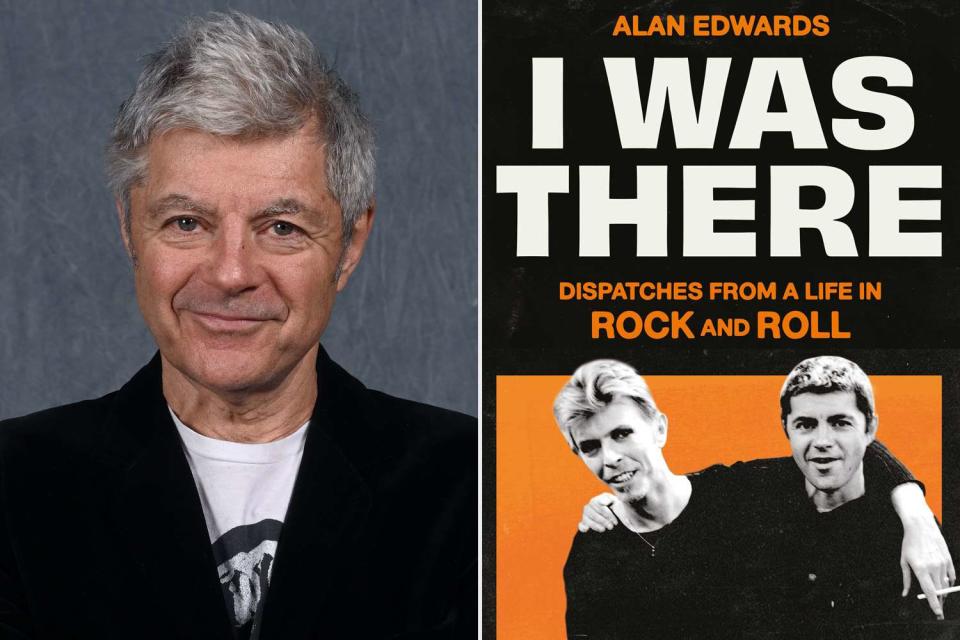
Dave J Hogan; Schuster and Schuster
Music PR Alan Edwards, left, and with one of his most famous clients, David Bowie, on the cover of his illuminating book.Veteran British music PR Alan Edwards spoke exclusively to PEOPLE about his life with some of the biggest names in music, including David Bowie, the Spice Girls and Amy Winehouse, plus David Beckham
"David gives me a hug. And of course that was the last time I saw him,” he tells PEOPLE about the last time he met David Bowie before his death in January 2016
“I felt I’d sort been in the presence of sort of greatness," he tells PEOPLE about his first meeting with David Beckham
David Bowie always contacted his media adviser Alan Edwards in London just before a new album was about to be released. But when the call came from his assistant Coco about his last album, Blackstar, there was more urgency than usual.
“She said, 'Do you think you could [meet] in a couple of days?' [I thought] he must be really excited about this record,” Edwards tells PEOPLE.
When they met, the singer was watching the movie The Good. The Bad, and the Ugly. “We’re flipping into a bit of Blackstar now and again. And he starts telling me these great stories about the 1960s when he was starting out in clubs and ducking and diving. So I was matching him with a few of my stories. And it's really, really good fun, really intimate," says Edwards.
Later, they were out in the street and "David gives me a hug. And of course that was the last time I saw him,” he continues. Bowie died in January 2016 — just two days after the album was released.
“He was probably more poorly that day than I realized," Edwards adds. "I suppose he wanted to say goodbye to me. You never know what people really think about you. You can't take it for granted. And I'd worked for him for nearly four decades. And maybe that was his sort of goodnight.”
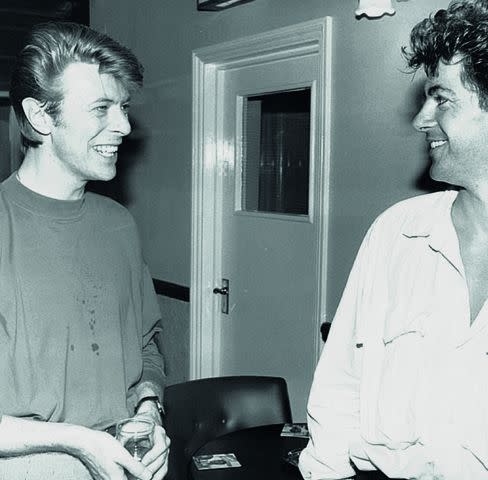
Courtesy of Alan Edwards
Alan Edwards with David Bowie, left.
The poignant moment is recounted in Edwards' new book, I Was There. In it, Edwards — one of the U.K.’s best-known and best-connected, music PRs — gives an insider's account of life alongside artists including Blondie, The Spice Girls, The Rolling Stones, Amy Winehouse and Prince.
Edwards says that despite his worldwide fame, Bowie could blend in and be "normal." Once, they took a train to Manchester in northern England: “We weren't in first class. People would be thinking ‘It can't be David Bowie.’ He would carry a Greek newspaper under his arm and often wear a cap so that people would think he can't be David Bowie,” Edwards tells PEOPLE.
After a BBC radio interview that day, Bowie asked if he could read the traffic reports on air. "So he spent the rest of the program telling people about the pile-ups on the M6 [freeway], or there's delays on the M25. I don't think anybody picked up on it.”
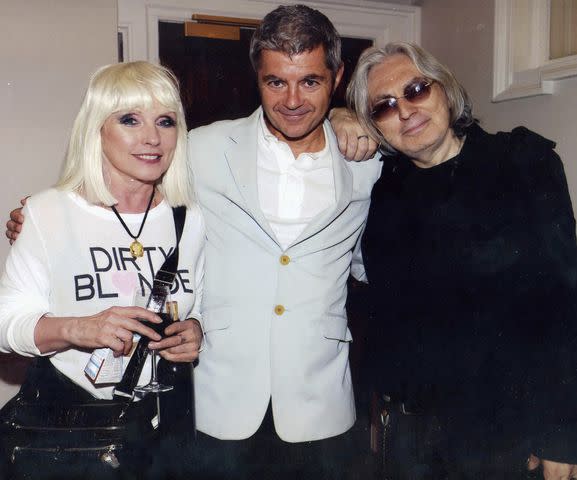
courtesy Alan Edwards
Alan Edwards with Debbie Harry, left, and Chris Stein, right, of Blondie.Blondie has been one of his longest-running clients — and it began with Edwards showing some PR hustle on one of the group’s early visits to the U.K. in Jan. 1978. “At the end of the gig, I knock at their changing room door and I say, ‘I'd like to be your PR.' Chris Stein opens the door and he just looks at me. Then he leans back into the dressing room and he says, [Edwards breaks into a NY accent] ‘Hey Debbie, this kid wants to do our pr. What do you think?’ And Debbie looks out and said, ‘OK, he'll do.’ And I get hired and I'm still literally working with them now,” he says.
Since then Stein has said they hired him because he looked like Brit glam rocker Marc Bolan. PR was in its infancy at the time and Blondie was bigger in the U.K. than they were back home in the U.S. at the time. That was soon to change, however. “It really exploded in London and to such a degree that people I think thought they were English after a while," Edwards says. "I was very proud of that.”
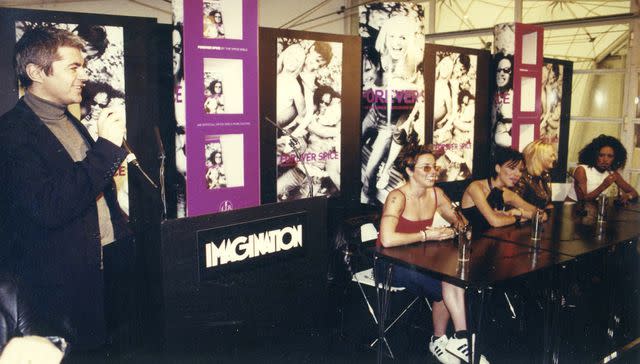
courtesy Alan Edwards
The PR Alan Edwards withthe Spice GIrls at the launch of Forever Spice in 1999“Debbie was very much part of the band. She didn't like travel in a separate thing. And she was part of Blondie. Looking back, you had Patti Smith, runaway Joan Jett, you had Poly Styrene, you had The Slits," he says. "It was very level. Punk was quite an androgynous sort of movement really. It was a bit of a watershed moment for female artists, even though maybe they didn't realize at the time.”
“She’s delightfully eccentric,” he adds of Harry. “And not scripted — you could never media train, Debbie. Last time she came over, she's doing interviews and she's mainly talking about bees. She didn't talk about punk rock, but about beekeeping. That’s so Debbie.”
It hasn't all been rock and roll. When Edwards first met soccer star David Beckham, he was a budding first-team soccer player at Manchester United and living in “digs” (lodgings with a landlady). He had so little food in the house, he could only serve Edwards baked beans from a tin when he came around in those early days, he writes in the book.
They also had to put coins in a meter to power up the electricity in the home. But Beckham's star power was evident then. “I felt I’d sort been in the presence of sort of greatness. It was quite clear that he was going to go the whole way. The other players went home at lunchtime, he'd train all afternoon. He was learning it all, but I guess like soaked it up. Learning, learning all the time. And he became a master of PR. He left us all behind.”
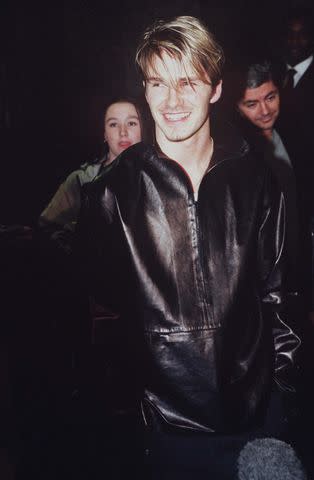
Herbie Knott/Shutterstock
David Beckham, in 1999, with Alan Edwards (right) keeping a close eye.Edwards started handling the Spice Girls, and he found himself helping Beckham cope with the lowest point of his professional life — when he was heavily criticized by some sections of the British media for being sent off in a crucial soccer game for England in summer 1998. Someone even hung an effigy outside a pub in south London.
“It was really, really vicious. He was nearly destroyed by it,” Edwards says. The PR was in New York, with the Spice Girls, and David fled there. The Spice Girls were playing at Madison Square Gardens and David — relatively anonymous at that time as soccer wasn’t so big in the U.S. — was pacing up and down outside unnoticed, and even asked for a ticket as he’d lost his pass. “I said ‘You can have the front row, whatever you want.’ He was very self-effacing.”
“To me, they were quite an extension of punk rock," he adds of The Spice Girls. "They were very British, very tabloid, very mad, very fun. A very sort of anti-establishment in a way, and lot of it was funny. The girl power message was quite serious too. And I had daughters who all looked up to them.”
One of those daughters was even given a helping hand by Victoria Beckham, when she was having doubts about school. "‘Look, I'm Posh Spice. Make sure you go to a posh school,’ " Victoria told his daughter Ruby — something she has recently reminded him of.
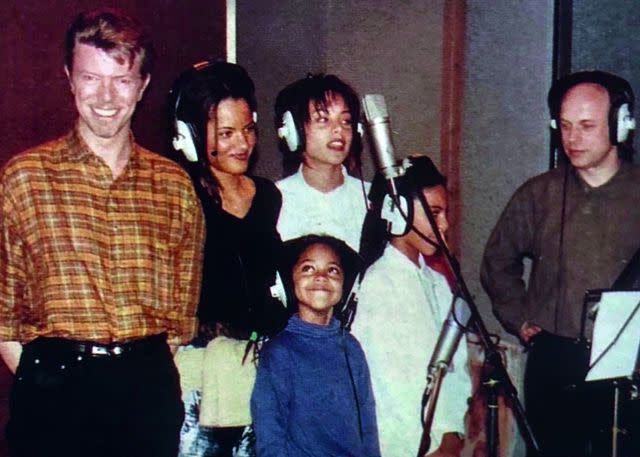
Courtesy Alan Edwards
David Bowie asked Alan Edwards' four daughters (Lola, Bryony, Josey and Ruby) to sing backing vocals on a track recorded by Brian Eno.“Ruby said, ‘It changed my whole life, because I did go to a posh school. She hadn’t wanted to go there. And it was because of Victoria that she went. It had seismic effect on her whole life.”
Edwards describes the frenetic first days when he was looking after their PR. “They were doing a gig on the balcony of the hotel in Rome for the fans. And then they decide they're going shopping in Paris and they go off in a private jet. And I'm just going along with it. And everyone's got piles of Gucci bags and then they go down to Madrid," he says breathlessly summing up how it was. "And then I'm in a disco with Victoria talking and finding actually that underneath that sort of very slightly austere unapproachable image, she's really friendly, and I was having a good laugh.”
He has a sense of how the Beckhams cope with fame amid the enormous amount of noise around them, and their children. “With them family’s the answer actually — they've always had that. Not just them and the kids but but also the mums, dads, Sandra Beckham. There's always been a lot of family around them from day one. So when you'd go to a TV studio, top of the pops, it would be the girls plus 50 — aunts, uncles, whatever. That’s really a strong protective bubble and I think that helped them keep their feet on the ground.”

Schuster and Schuster
Alan Edwards' book jacketEdwards and his company Outside Organisation represented Amy Winehouse during her short, Grammy-winning career and since her sudden and tragic death in July 2011, and her family and the Foundation set up in her honor.
He says Winehouse's “magic was her authenticity. She lived it — it was a bit like Billie Holiday in that you could feel the angst, the pain, you could feel it in her voice, you could feel it in the songs.”
He adds, “I think we could all empathize with it. Not that we lived the same life, but you kind of felt part of it. It wasn't something that was constructed and cleverly put together in Hollywood and manufactured.”
Edwards recalls seeing her perform a small gig in a shop with a colleague. “She was just waif-like, a puff of wind could have blown her over. And then this voice comes out. It was just something God-given, there was a depth to it. And pain"
"For all artists, it's not a job. They are like that the whole time. They put your whole self into it for better or for worse. And she did that.”
For more People news, make sure to sign up for our newsletter!
Read the original article on People.


